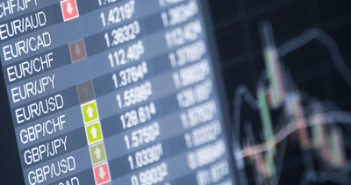North American equities snapped their six-day winning streak yesterday, with the S&P shaving off 0.22% from its valuation, while safe-haven’s like the Japanese Yen gained strength. Soft macro-economic data out of the US acted as the catalyst for investors to eye some profit-taking opportunities, as New Home Sales in the US over the month of March fell by 14.5%, and the US Manufacturing PMI missed expectations coming in at 55.4, down from last month’s reading of 55.5. The wash-out was hardly violent, as yields on the 10-year US treasury finished the day essentially flat trading just below 2.7%, and the cash VIX increased by 0.61% while the rest of the curve flattened.
In Ukraine news, it appears as if the region is close to securing a deal with the IMF to get its hands on some much needed cash to help pay its bills this year. According to an unnamed source at the IMF the staff has endorsed a $17bn loan package to Ukraine, that will be voted on at an April 30th board meeting.  Elsewhere, it has been reported that fighting between the Ukrainian military and pro-Russian rebels has broken out again, with skirmishes igniting around the town of Slavyansk as Ukraine looks to proceed with their anti-terrorism campaign. Obviously Putin is not happy about what is transpiring and at a meeting with media in St. Petersburg said that the use of force in Ukraine “would have consequences.â€
One of the main focuses overnight was the survey from the Ifo Institute on German business climate, which comes right on the heels of the better than expected PMIs in the region that were released yesterday. The strong numbers in both the manufacturing and service sectors of the Germany economy helped drag the composite reading of the entire zone to its highest level since May of 2011, which is important because of how closely PMI tracks ahead of GDP growth for the common-currency bloc.  The upward trajectory of PMI prints bodes well for the potential to see stronger GDP growth in Q1, and barring a large downward surprise on flash CPI released next week, could hold the European Central Bank back from taking any action at their next policy meeting. The results from the Ifo survey came in better than expected at 111.12, handily beating the median analyst forecast of 110.5, as the positive mood around the Germany economy trumps the crisis in Ukraine
The recent resilience of the EUR can partly be attributed to the inaction of the ECB, with the board members confident the dis-inflationary pressures are transitory in nature, and will bottom out as we enter the summer months. Trying to play the short-side of the EUR has been a painful task over the last six months, and should the flash CPI reading signal a bottom might be in place, EURUSD has the ability to make another run at the 1.40 handle; although it is around this level we feel ECB board members could get a little skittish around the EUR’s strength and try to jawbone the market back down. To that end, Mario Draghi was speaking today, and during his address hit on all the usual dovish talking points. Draghi did mention that the ECB could pursue monetary policy if tensions persisted in bond and money markets (referring to excess liquidity in the system dropping below EUR 100bn and EONIA trading at about two times the effective Fed Funds rate), but held back from mentioning any policy action was imminent. EURUSD is essentially flat this morning just above the 1.3800 level, as the opposing forces of a bullish Ifo survey and a dovish Draghi keep the pair in check. The major equity bourses have perked back up, trading well in positive territory ahead of the North American cross.
Heading into the North American open, equity futures are reversing yesterday’s losses as positive earning surprises from such companies as Facebook, Apple, and Caterpillar have investors looking to increase their exposure to stocks. Also adding to the positive market sentiment durable goods orders in the US for the month of March came in with strong beats across the board. The headline reading increased by 2.6% (vs. expectations of 2.0%) while the business investment proxy of non-defense, ex-air increased by 2.2% (vs. expectations of 1.5%.) The Loonie is slightly stronger against the USD this morning, benefiting from positive risk appetite that has equities and high-yield well bid, although USDCAD is still within the range its been contained to all week in the low 1.10s. With a relatively quiet end to the week, especially with the subdued volatility seen in currency markets, make sure to speak with your dealing teams around strategy heading into next week, as there are a great deal of event risks that could vastly shake-up the dull trading we seen this week
Further reading:
durable goods orders
Euro-zone QE: How about buying Gold?



